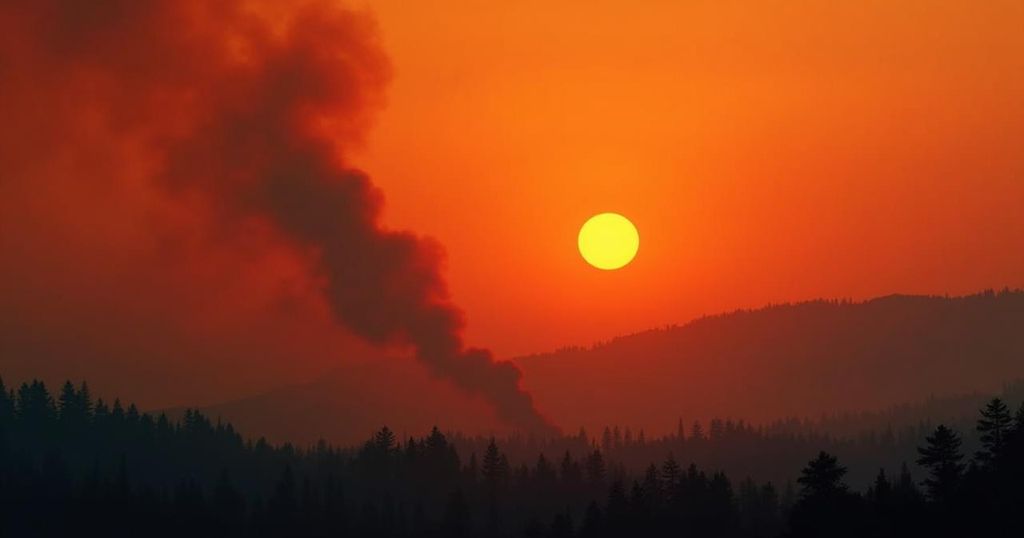The Amazon on Fire: A Call for Urgent Action as Smoke Smothers South America

Wildfires are raging across South America, particularly affecting the Amazon in Brazil, resulting in severe air quality issues and a public health crisis. The fires, exacerbated by climate change and human activities, have led to a surge in respiratory ailments among local populations and pose threats to Indigenous peoples’ lands. Authorities stress the need for urgent collective action to address these environmental challenges before they escalate further.
The Amazon rainforest, particularly in the state of Rondônia, Brazil, is currently engulfed in a dire environmental crisis as vast areas burn due to predominantly anthropogenic wildfires. This alarming situation has transformed previously celebrated blue skies into a shroud of smoke, severely affecting air quality and the health of local populations. The fires, which have also spread across neighboring countries such as Ecuador, Paraguay, Peru, and Bolivia, are resulting in a significant rise in respiratory issues among the affected communities, illustrating the broader implications of these ecological disasters. In Rondônia, the government healthcare facilities are witnessing an influx of patients with respiratory complaints, as the smoke has rendered it difficult to even see across local rivers. Dr. Lilian Samara de Melo Lima has noted the unusual intensity of the current wildfires, attributing them to the aggressive expansion of agriculture and ranching into previously untouched areas of the Amazon, suggesting a direct connection to human activity. “This year has been truly atypical,” she stated, criticizing the “devastating, predatory, reckless” encroachment into regions that housed Indigenous communities for generations. Marilene Penati, Porto Velho’s health secretary, echoed this concern about the overwhelming air pollution affecting the health of the city’s 500,000 residents. Experts indicate that the situation is part of a continent-wide issue exacerbated by climate change and El Niño, resulting in a record number of fire hotspots being detected through satellite monitoring in various South American countries. Paraguay’s Chaco forest and Peru’s Andes have similarly faced extensive fires, placing enormous stress on local ecosystems and agricultural economies, and posing a threat to Indigenous populations dependent on these lands. In Peru alone, at least 20 individuals have perished due to the fires, which activists argue are predominantly instigated for the expansion of agricultural and illicit land use rather than traditional practices. As fires persist across the region, including Bolivia’s agricultural heartland in Santa Cruz, the Brazilian health secretary poignantly remarked that “The Earth is sick… the Earth is crying out for help,” underscoring the urgency of a collective response to combat this escalating climatic crisis. The alarming reality is a call to action for countries to address not only the immediate effects of these wildfires but also the underlying systemic causes that perpetuate environmental degradation and climate change. Without significant intervention and a commitment to sustainable practices, the repercussions of these fires will continue to intensify, harming not only the environment but the very fabric of society across South America.
Recently, large sections of South America have been swept up in catastrophic wildfires primarily attributed to human activities aimed at land-clearing for agriculture and ranching. These fires have not only affected Brazil’s Amazon but have also spread to neighboring countries, leading to a continental crisis exacerbated by climate change and drought conditions linked to the El Niño phenomenon. The devastation is palpable in urban areas such as Porto Velho, where locals are facing severe health impacts due to deteriorating air quality. Health officials are sounding alarms about rising respiratory issues among residents, emphasizing the urgent need for a coordinated response to this multifaceted crisis.
In summary, the wildfires consuming vast stretches of South America are a manifestation of deep-rooted environmental issues precipitated by human encroachment and climate change. The health impacts are dire, prompting health officials to call for immediate action and concern for the well-being of both the planet and its inhabitants. As the smoke descends upon cities and the flames continue to spread across forests and savannahs, it becomes increasingly clear that a collective reset in our relationship with nature is essential to avert further disaster.
Original Source: www.theguardian.com





